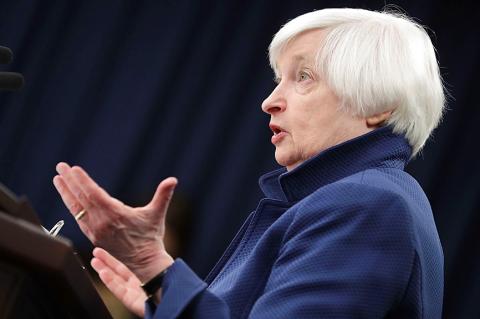The long cycle of falling interest rates in Asia could be over after the US Federal Reserve’s third rate increase in 15 months was followed quickly by monetary tightening in the world’s second-biggest economy, China.
The Fed’s widely anticipated rise of 25 basis points on Wednesday was also only its third since the global financial crisis, having reined in earlier temptations to raise rates out of concern for the effect on fragile emerging economies that still needed looser monetary conditions.
However, the Fed again signaled that such reticence is over, repeating its projections for at least two more rate increases this year as the US economy improves.

Photo: AFP
“At the very least, the Fed’s desire to step up the pace of policy normalization has changed the conversation at many central banks globally,” said Sean Callow, an economist with Westpac in Sydney.
“Further monetary easing is now largely seen as only if needed to ‘break the glass,’ not a plausible baseline,” Callow said.
The People’s Bank of China yesterday raised the rates on the short-term funding operations it conducts for the nation’s banks for a third time this year.
The Fed’s move would otherwise make it harder for China to stop its currency weakening and arrest a persistent outflow of capital. China also wants to cool a run-up in debt and the risk of a property bubble.
The Bank of Japan’s regular policy meeting yesterday opted to stand pat with its 0.1 percent short-term interest rate target and a loose commitment to keep buying bonds, though core inflation is far below its ambitious 2 percent target.
The Fed’s new policy path is a sea change for global markets used to a decade of easy money.
While emerging markets are showing some signs of strength, with a recovery in commodity prices and growth in exports, they are struggling to fire up domestic demand.
However, their freedom to fit domestic rates to local demand conditions is constrained by the need to keep hold of the foreign capital that flooded in seeking higher yields when developed world rates were at rock bottom.
They also need to prevent their currencies from tumbling against a rallying US dollar.

MAKING WAVES: China’s maritime militia could become a nontraditional threat in war, clogging up shipping lanes to prevent US or Japanese intervention, a report said About 1,900 Chinese ships flying flags of convenience and fishing vessels that participated in China’s military exercises around Taiwan last month and in January last year have been listed for monitoring, Coast Guard Administration (CGA) Deputy Director-General Hsieh Ching-chin (謝慶欽) said yesterday. Following amendments to the Commercial Port Act (商港法) and the Law of Ships (船舶法) last month, the CGA can designate possible berthing areas or deny ports of call for vessels suspected of loitering around areas where undersea cables can be accessed, Oceans Affairs Council Minister Kuan Bi-ling (管碧玲) said. The list of suspected ships, originally 300, had risen to about

DAREDEVIL: Honnold said it had always been a dream of his to climb Taipei 101, while a Netflix producer said the skyscraper was ‘a real icon of this country’ US climber Alex Honnold yesterday took on Taiwan’s tallest building, becoming the first person to scale Taipei 101 without a rope, harness or safety net. Hundreds of spectators gathered at the base of the 101-story skyscraper to watch Honnold, 40, embark on his daredevil feat, which was also broadcast live on Netflix. Dressed in a red T-shirt and yellow custom-made climbing shoes, Honnold swiftly moved up the southeast face of the glass and steel building. At one point, he stepped onto a platform midway up to wave down at fans and onlookers who were taking photos. People watching from inside

Japan’s strategic alliance with the US would collapse if Tokyo were to turn away from a conflict in Taiwan, Japanese Prime Minister Sanae Takaichi said yesterday, but distanced herself from previous comments that suggested a possible military response in such an event. Takaichi expressed her latest views on a nationally broadcast TV program late on Monday, where an opposition party leader criticized her for igniting tensions with China with the earlier remarks. Ties between Japan and China have sunk to the worst level in years after Takaichi said in November that a hypothetical Chinese attack on Taiwan could bring about a Japanese

The WHO ignored early COVID-19 warnings from Taiwan, US Deputy Secretary of Health and Human Services Jim O’Neill said on Friday, as part of justification for Washington withdrawing from the global health body. US Secretary of State Marco Rubio on Thursday said that the US was pulling out of the UN agency, as it failed to fulfill its responsibilities during the COVID-19 pandemic. The WHO “ignored early COVID warnings from Taiwan in 2019 by pretending Taiwan did not exist, O’Neill wrote on X on Friday, Taiwan time. “It ignored rigorous science and promoted lockdowns.” The US will “continue international coordination on infectious